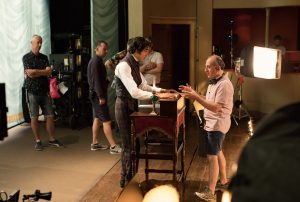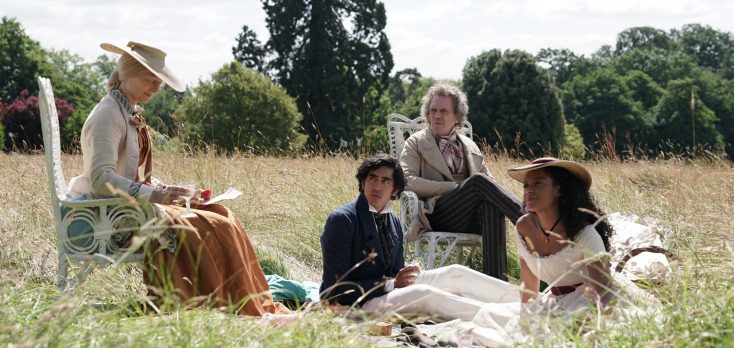
Dev Patel and Writer/Director Armando Iannucci on the set of THE PERSONAL HISTORY OF DAVID COPPERFIELD. ©20th Century Studios. CR: Dean Rogers.
By ANGELA DAWSON
Front Row Features
HOLLYWOOD—Oscar nominee and Emmy winning writer/director Armando Iannucci (“In the Loop,” HBO’s “Veep”) knew just who he wanted to cast as the titular character in his adaptation of Charles Dickens’ “David Copperfield,” after watching Dev Patel’s performance in the 2016 drama “Lion.”
“I saw the strength, maturity, charisma and stillness, because I needed that (for the David Copperfield character),” he says during a Zoom call. “I thought, ‘That’s David Copperfield.’”
Iannucci adds that Patel already was on his radar, having seen his acclaimed performance in Danny Boyle’s “Slumdog Millionaire” and the “Best Exotic Marigold Hotel” movies. But it was the British actor’s depiction of an adoptee who embarks on an emotional journey of discovery to find his long-lost Indian family that really sold the filmmaker.
“Having seen that other side—that strength—for me that was the point where I couldn’t imagine anyone else playing the part,” he says.
Patel, 30, was delighted that he was called upon to play one of the most beloved characters from classic British literature.
“It was incredible,” he says, on the same Zoom call with Iannucci. “The opportunity to kind of exist in this (Victorian) world. Obviously, it was about the joys of sitting in back of a horse and carriage and getting to wear a top hat and live out my childhood dreams, but more than that, what an amazing role. More than the era, it was about the opportunity to play David Copperfield in an almost semi-autobiographical story.”
Though based on Dickens’ “David Copperfield,” the film is actually titled “The Personal History of David Copperfield,” which blends the classic riches-to-rags-to-riches story with Copperfield writing (and sometimes narrating) his autobiographical story.
Much ado already has been made in the media about Iannucci’s “color-blind” casting, not just with Patel (whose parents are Gujarati Indians who emigrated to England from Kenya before he was born) in the lead but with other actors of color, including Nikki Amuka-Bird (“Jupiter Ascending”), Rosalind Eleazar (TV’s Harlots”) and Benedict Wong (“Doctor Strange”) in significant roles.
The filmmaker, a son of Italian immigrants who was born in Scotland, points out that the theater has been casting non-white actors in roles traditionally played by white actors for decades, so why shouldn’t film also reflect modern society’s broader spectrum? The film also stars Tilda Swinton (“Avengers: Endgame”), Hugh Laurie (“House”), Gwendolyn Christie (“Game of Thrones”), Daisy Mae Cooper (BBC Three’s “This Country”) and Ben Whishaw (“Skyfall”).
Patel says he is grateful to Iannucci for opening up the casting to all.
“He allowed us to all come together and what an opportunity it was as a role,” he says. “There’s real tragedy and there are moments of real humor and euphoria. Armando is a really gifted and physical comedian so in our rehearsal process, we had two weeks of all of us together and we got to have a lot of fun, which was great.”
“It’s not just myself,” he continues. “If you look at the incredible performances of Nikki (“Mrs. Steerforth”) Rosalind (“Agnes”) and Benedict (“Mr. Wicklow”), to name a few, they were so magnificent in their roles and they all helped the cause, if there is one.
Patel adds, “The industry’s really changing and it’s these brave auteur-like voices like Armando that lead the way and shine the light on how it can be done successfully. It’s a value-add to the story. It can sometimes make the threads of the story even more potent.”
Patel credits Iannucci not only for giving the film a modern edge, but also for instilling in him an appreciation for Dickens. The actor admits he hadn’t read “David Copperfield” before landing the movie role. He jokes that he initially thought the film was going to be about the famous modern-day magician.
“For me, Charles Dickens was something we were force-fed in school,” the actor admits. “I hate to say it but it was very bleak and … (He groans.). With Armando opening up the world in terms of casting, it made it more representative of the Britain where I grew up. This is an opportunity for another young child not to miss out on this amazing tale because now they can really relate to a face that they find on the screen.
He points out that Dickens wrote for the Everyman. He would go out on stage and read chapters of his books. It was meant for the masses.
“By doing this, it makes it more relevant and commercially viable to a wider audience,” Patel says.
“The Personal History of David Copperfield” isn’t Iannucci’s first venture into the world of Dickens. In 2012, he wrote and starred in the BBC TV special “Armando’s Tale of Charles Dickens,” a re-evaluation of the author “without the Victorian seriousness.” And after years spent turning dense political narratives into comedic farce in his movies and TV shows, he turned once again to his frequent collaborator and co-writer Simon Blackwell to adapt Dickens’ mid-19th century tome.
“There are seven or eight major characters other than David,” says Iannucci of the film. “I wanted to make sure we stayed with them throughout … so I took liberties with some of the story.”
Sometimes the “liberties” were small. For example, Wilkins Micawber, played by Iannucci’s frequent go-to actor Peter Capaldi (“In the Loop,” “The Thick of It”), the pauper whose family David lives with when he’s sent to London to work in a bottling factory, is given a squeezebox to play (very badly). In the Dickens book, it’s a teacher, Mr. Mell, at David’s school who can barely play the flute.
“That’s an example where I took little moments from the book, little side episodes for minor characters, when they felt appropriate for our main characters,” Iannucci says.
Beyond the humor and the relationship to Dickens’ own life, the filmmakers explored other aspects of the author’s work. For example, the story plays around with memory and revisits Copperfield’s past with different kinds of recollections—and delves into what is the truth and what isn’t.
Adapting Dickens presented a challenge for the notable filmmaker.
“I usually generate my own material, my own stories,” Iannucci says. “This is only my second adaptation as a film. I’ve always been inspired by Dickens, but it was when I re-read ‘David Copperfield’ about 10 years ago that I was struck by how modern it was.
“It really hit home—the themes of identity and anxiety, social anxiety, status anxiety, poverty and wealth existing side-by-side, debt, housing conditions, mental illness like with Mr. Dick (Laurie’s character) treated really honestly. It struck me as a story I just wanted to tell. Also, it was about the celebration of writing and the celebration of playfulness and jokes and imagery and characters. All that rejoicing in storytelling.
“It struck me, partly, as part of my life growing up as part of an immigrant family in the U.K., becoming a writer but also that question of ‘Do I fit in? Do I belong?’ And then the comedy of it and the social relevance. It kind of shouted at me that it needed to be made into a film and I just waited until I felt confident enough to do it.”
The period drama, like the book, is filled with quirky characters, including David’s donkey-hating aunt Betsey Trotwood (Swinton), who insists on calling her nephew “Chopwood.” When his widowed mother remarries, David is sent to London to toil in a bottle-making factory while living with an eccentric and indigent family. Discovering as an adult that his mother has died, he returns to the countryside and lives with his aunt and her boarder, Mr. Dick, who is fixated on Charles I.
Meantime, David is taking notes on his life, and even mysteriously attends his own birth in a flashback. Through the adventure, David meets other interesting and bizarre characters—Mr. Wicklow, his aunt’s wine-loving financier (Wong), Agnes (Wicklow’s daughter, whom David eventually grows fond of), and the scurrilous Uriah Heep (Whishaw).
Says, Iannucci, “David goes on this journey. He starts off pure and vulnerable, angry and lost, and we see him gradually discover his identity and ability to assert himself. “
A recurring joke throughout is that David keeps acquiring new nicknames from the people he meets, which he finds annoying. That was one of the characteristics that Patel could relate.
“I used to get a lot of flak for my big ears, which I now have hidden by my hair,” he recalls with a chuckle. “My sister used to call me ‘Dobby,’ like the house elf from ‘Harry Potter.’ And my manager calls me ‘The English Patient’ because I’m always ill. The list goes on. Do you have 30 minutes?”
Originally slated to be released on May 8, “The Personal History of David Copperfield” got pushed back to Aug. 28 owing to the closure of movie theaters because of the health pandemic. But Iannucci is pleased that audiences finally will be able to see his film.
“For some people, it will be the first film they see going back into the cinema,” he says with delight. “For others, that won’t be possible, and so they can watch it on streaming media. I’m just happy that it’s out there. I’m glad it’s a film that has a positive message and is about community and support and friendship and identity.
“I don’t know how I would have felt if it was (my previous film) ‘The Death of Stalin’ I was trying to sell in these circumstances,” he says with a laugh. “I just want as many people to see it one way or another.”





